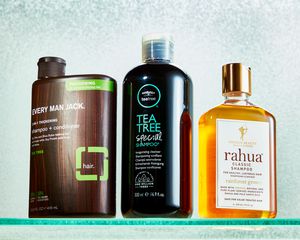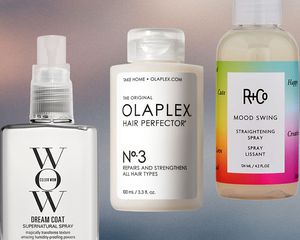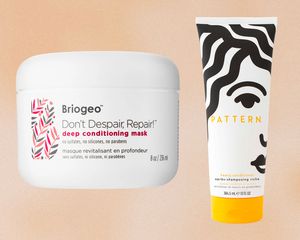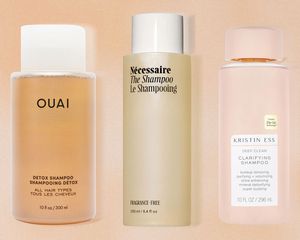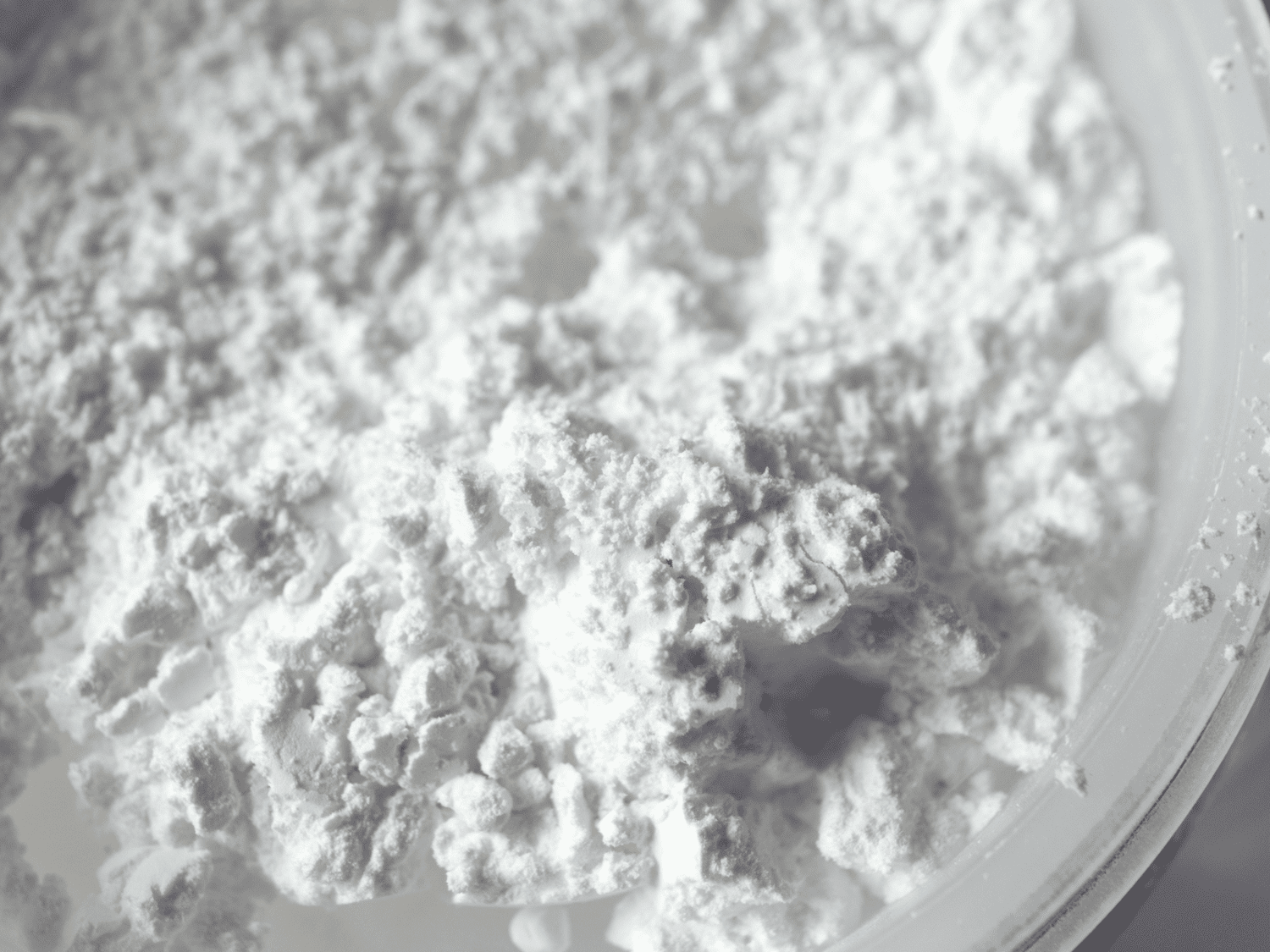
Getty
While white flakes on your scalp and hair can occur for several reasons—including excess oil production, scalp psoriasis, and dryness—one of the most common culprits is dandruff. Treatments for dandruff range from over-the-counter shampoos and at-home remedies to dermatologist-prescribed creams, but almost all of these products have one ingredient in common: zinc pyrithione.
"Zinc pyrithione works as an antifungal, thereby reducing the amount of fungus which can trigger inflammation and scaling, which may be seen clinically as dandruff," board-certified dermatologist Marisa Garshick, MD, explains. But is this popular ingredient deserving of its ubiquity in the haircare aisle? We turned to Garshick and Dendy Engelman, MD, FACMS, FAAD, along with certified trichologist William Gaunitz, FWTS, for answers.
Meet the Expert
- Dendy Engelman, MD, FACMS, FAAD, is a board-certified dermatologic surgeon in New York and a member of the Byrdie Beauty & Wellness Review Board.
- Marisa Garshick, MD, is a board-certified dermatologist and a clinical assistant professor at Cornell.
- William Gaunitz, FWTS, is a certified trichologist and founder of Advanced Trichology.
What Is Zinc Pyrithione?
Zinc pyrithione is a chemical compound consiting of zinc and pyrithione. It is commonly found in dandruff treatments due to its antifungal, antimicrobial, and antibacterial properties, which fight the source of dandruff flakes and itch.
Zinc Pyrithione for Hair
Type of ingredient: Antifungal, antimicrobial, and antibacterial properties
Main benefits: Treats dandruff, soothes scalp irritation, regulates oil production, and prevents itching.
Who should use it: Zinc pyrithione is best for those experiencing dandruff or seborrheic dermatitis, which may be associated with an oily scalp. It is best to consult a dermatologist to determine the cause of your scalp flakes or irritation before using zinc pyrithione.
How often can you use it: Shampoos containing zinc pyrithione can be used daily, and those individuals dealing with seborrheic dermatitis or dandruff are often advised to cleanse daily. If the scalp is dry, it is okay to use a zinc pyrithione shampoo two to three days per week and a non-medicated shampoo on alternating days.
Works well with: Selenium sulfide, another ingredient commonly found in dandruff shampoos stronger than zinc pyrithione. Additionally, some individuals may alternate with other anti-dandruff ingredients, such as ketoconazole, an antifungal ingredient.
Don’t use with: There are no known ingredients that negatively interfere with zinc pyrithione; however, it is advised that you speak to a medical professional before using if you are pregnant or nursing.
Benefits of Zinc Pyrithione For Hair
The benefits of zinc pyrithione extend beyond the skin of the scalp. By improving the health of the scalp, the health of the hair benefits as well. Zinc pyrithione has the power to treat a variety of issues, including dandruff, itchiness, acne, and scalp psoriasis by targeting the yeast/fungus that is causing the problem, Engelman explains.
- Fights dandruff-causing fungus: The antifungal, antimicrobial, and antibacterial properties stop dandruff at its source. "Zinc pyrithione is naturally anti-inflammatory and is also antifungal and antibacterial," says Gaunitz. "Since dandruff is caused directly by an excessive amount of fungus and yeast living on the scalp, by adding the zinc pyrithione, you decrease the fungal buildup on the scalp and alleviate the inflammation causing the dandruff."
- Prevents itching: Dandruff is one of the leading causes of scalp itchiness. By preventing dandruff and eliminating the irritating yeast/fungus that causes it, zinc pyrithione provides itch relief quickly.
- Regulates oil production: Zinc pyrithione can control the oil production and dandruff often found in those with seborrheic dermatitis.
- Improves overall scalp health: Dandruff disrupts the health of the scalp by clogging follicles with flakes and by causing inflammation and irritation. Zinc pyrithione is able to improve the overall health of the scalp by preventing and treating dandruff.
- Promotes hair growth: Zinc pyrithione has the potential to impact hair growth. "Since a number of thinning hair and hair loss concerns are related to the scalp, zinc pyrithione can help clear dead skin cells or conditions that prevent hair growth (clogged hair follicles, psoriasis, etc.) and thus promote fuller, healthier hair," says Engelman. Garshick agrees and points out a study that showed that daily use of 1 percent pyrithione zinc shampoo over 26 weeks showed an improvement in hair growth.
- Improves overall appearance of hair: The overall appearance of the hair is heavily influenced by the oiliness of the scalp and the thickness of the hair. By regulating oil production and encouraging new growth, zinc pyrithione can boost the overall appearance of the hair.
What Hair Types Can Use Zinc Pyrithione?
Our experts agree that zinc pyrithione is safe for all hair types but would be most beneficial for those experiencing dandruff, seborrheic dermatitis, or other scalp conditions that are aggravated by fungus/yeast. Some formulations of shampoos and topical scalp products include zinc pyrithione and hydrating and moisturizing ingredients that would be better for those with dry or color-treated hair. If you don't have dandruff or other scalp conditions, skipping the products with zinc pyrithione is best. "The only downside is that it could ultimately dry out the hair and scalp slightly and upset a healthier scalp microbiome if there is no dandruff or inflammation," says Gaunitz.
It is always best to speak with a medical professional to evaluate the scalp and determine the best course of treatment. For those with dry or sensitive skin, it is best to slowly incorporate zinc pyrithione into a routine and use caution as some dryness and irritation may occur, Garshick explains. Engelman cautions that it is best to speak to a medical professional if you are pregnant or nursing before using zinc pyrithione.
How to Use It
Zinc pyrithione is easily found in many drugstore and supermarket shampoo products. There are also leave-in treatments available from retail haircare lines. Depending on the severity of your condition, your dermatologist may recommend a stronger treatment that may need a prescription.
- Use in an anti-dandruff shampoo: Zinc pyrithione is most often found in anti-dandruff shampoos. For best results, you should wet your hair and massage the shampoo into your scalp. Let it sit for approximately one minute (or as instructed on the shampoo label) before shampooing the rest of your hair and then rinse out. According to Garshick, usage will depend on the sensitivity and state of your scalp. "While many shampoos containing zinc pyrithione can be used daily, I typically recommend using it at least two to three times per week. For some individuals dealing with seborrheic dermatitis or dandruff, I often recommend washing the scalp daily or every other day to help eliminate the build-up of oils or dead skin, which may contribute to scaling or flaking. If someone is concerned about dryness of the scalp, it is okay to use a zinc pyrithione shampoo a few days per week and a non-medicated shampoo on the alternating days."
- Use in a hydrating conditioner: Conditioners with zinc pyrithione can help fight dandruff, itch, and flaking while restoring scalp balance and providing hydration. After shampooing, massage the conditioner into your scalp and hair and cover it with a shower cap. Leave on for 3 minutes and wash out. Follow the instructions on the label for the best results.
- Relieve itch and flakes with a serum: Serums with zinc pyrithione are great for those with oily scalps or severe flaking and dandruff. Apply the serum to the scalp in between washes to help with itch and flakes. Follow the directions on the product, but most can be applied several times a day.
- Apply in a scalp-soothing leave-in cream: If your scalp tends to get dry, a leave-in cream is often more soothing and moisturizing than a serum. The creams are often infused with hydrating products like vitamin E and argan oil to protect and moisturize, while the zinc pyrithione relieves dandruff, itch, and irritation.
